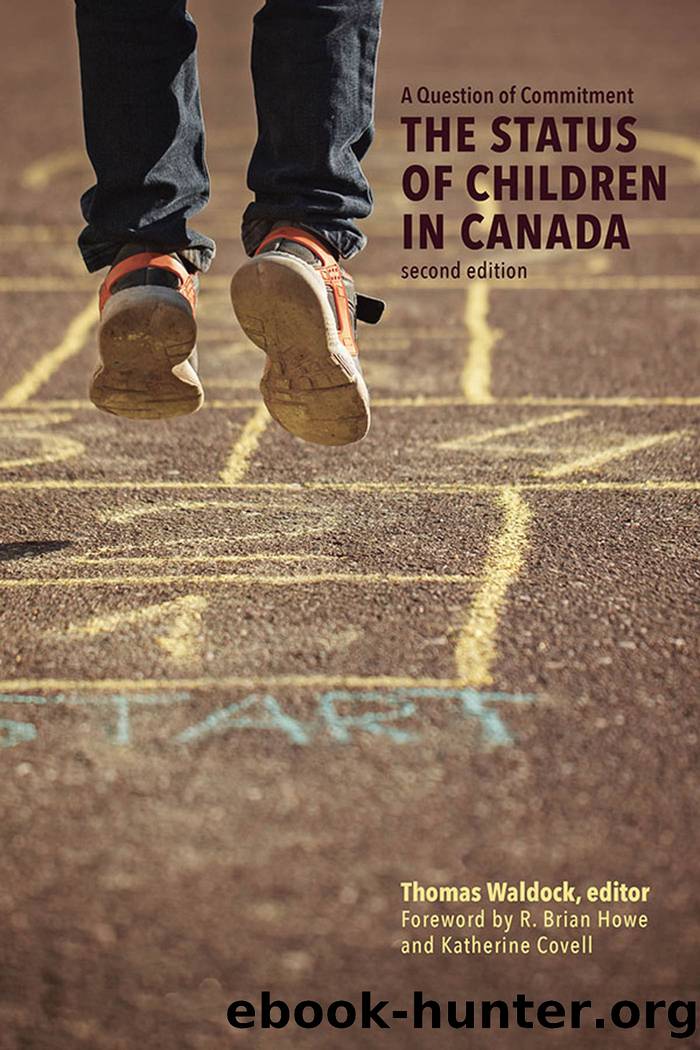A Question of Commitment by Thomas Waldock

Author:Thomas Waldock
Language: eng
Format: epub
Publisher: Wilfrid Laurier University Press
Published: 2020-07-14T16:00:00+00:00
Chapter 9
More Than a Symbol
Canada’s Legal Justification of Corporal Punishment of Children
Joan Durrant
In 1979, Sweden became the first country to unequivocally prohibit all corporal punishment of children. This was the first time in world history that children’s rights to full protection were enshrined in law. The Swedish law states: “Children are entitled to care, security and a good upbringing. Children are to be treated with respect for their person and individuality and may not be subjected to corporal punishment or other injurious or humiliating treatment” (Chapter 6, Section 1, Parenthood and Guardianship Code).
Sweden’s law was highly significant for several reasons. First, it erased the hypothetical line between “punishment” and “abuse.” All corporal punishment was prohibited, no matter how “light.” Second, it ended the presumptive distinction between corporal punishment administered by parents and that administered by others in their lives. All corporal punishment was prohibited. Third, the law was written from the perspective of children. Its intent was to protect children from harm, rather than to protect adults from being held accountable should they harm them. Finally, Sweden’s law recognized children as independent rights bearers, entitled not only to protection from violence, but to a standard of care. It enshrined children’s rights to dignity as persons, with identities separate from those of the adults who care for them and, by implication, with an autonomous voice. (For more information on the history and outcomes of this law, see Durrant, 1999, 2000, 2003; Durrant & Janson, 2005; Durrant & Olsen, 1997.)
Covell and Howe (2001) have set out three stages of legal evolution, proceeding from social laissez-faire, in which children are seen primarily as “objects of parental authority” (p. 16), through paternalistic protection, in which children are viewed as in need of state protection when mistreated, to the stage of children’s rights, in which children are recognized as independent bearers of rights and the state is viewed as having an obligation to fulfill those rights. In this third stage, “children are entitled to have their needs provided for not because parents have obligations or because the state has a paternalistic duty to children, but because children have fundamental rights to having their basic needs fulfilled” (p. 19). Sweden’s law is the embodiment of stage 3 law.
Since Sweden passed its historic law, 57 countries have followed its lead. These countries are located in almost all regions of the world.1 While most of their laws are based on children’s rights to full protection, some also recognize children’s rights to dignity and/or redress for violations of their rights.
• In Bulgaria: Every child has a right to protection against all methods of upbringing that undermine his or her dignity; against physical, psychical, or other types of violence; against all forms of influence which go against his or her interests (Article 11.2, Child Protection Act, 2000).
• In Latvia: A child shall not be treated cruelly, tortured or physically punished, and his or her dignity or honour shall not be violated (Law on Protection of the Rights of the Child, 1998).
Download
This site does not store any files on its server. We only index and link to content provided by other sites. Please contact the content providers to delete copyright contents if any and email us, we'll remove relevant links or contents immediately.
Day by Elie Wiesel(2561)
The Age of Genius by A. C. Grayling(2373)
Gideon's Spies: The Secret History of the Mossad by Gordon Thomas(2214)
The Gulag Archipelago (Vintage Classics) by Aleksandr Solzhenitsyn(1964)
FATWA: Hunted in America by Pamela Geller(1916)
Columbine by Dave Cullen(1741)
Men Explain Things to Me by Rebecca Solnit(1582)
The Rule of Law by Bingham Tom(1577)
Examples & Explanations: Administrative Law by William F. Funk & Richard H. Seamon(1539)
Anatomy of Injustice by Raymond Bonner(1504)
Three Cups of Tea by Greg Mortenson(1498)
That Every Man Be Armed by Stephen P. Halbrook(1451)
ADHD on Trial by Michael Gordon(1448)
The Source by James A. Michener(1428)
Gideon's Spies by Gordon Thomas(1405)
Future Design by Unknown(1355)
Palestinian Walks by Raja Shehadeh(1346)
Constitutional Theory by Carl Schmitt(1323)
Fast Times in Palestine by Pamela Olson(1320)
